
Find Help
More Items From Ergsy search
-

What role do genetics play in motor neurone disease?
Relevance: 100%
-
Is motor neurone disease hereditary?
Relevance: 97%
-

What causes motor neurone disease?
Relevance: 96%
-
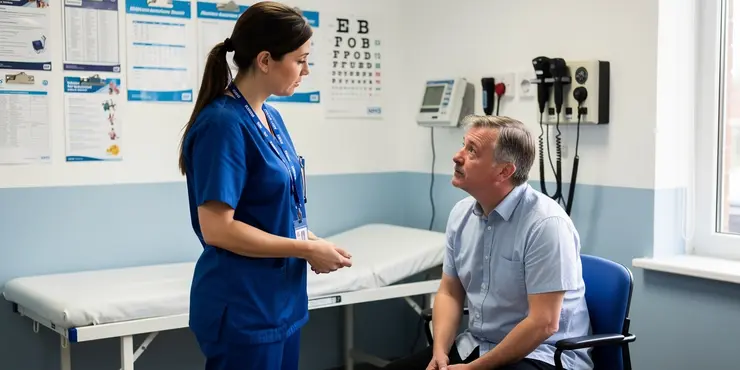
What is motor neurone disease?
Relevance: 96%
-
Are there different types of motor neurone disease?
Relevance: 92%
-
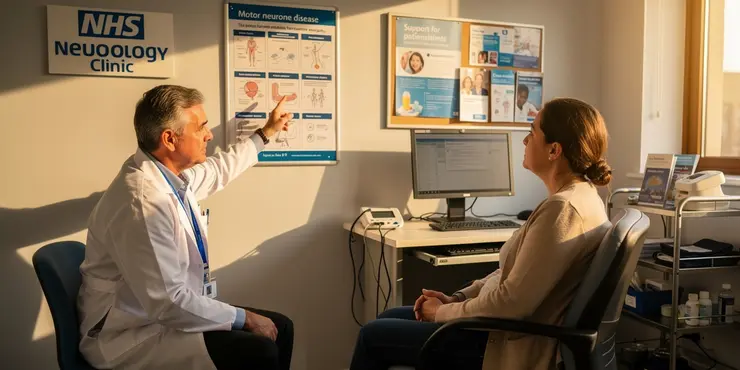
Is there a cure for motor neurone disease?
Relevance: 89%
-

How is motor neurone disease diagnosed?
Relevance: 85%
-

What treatments are available for motor neurone disease?
Relevance: 81%
-
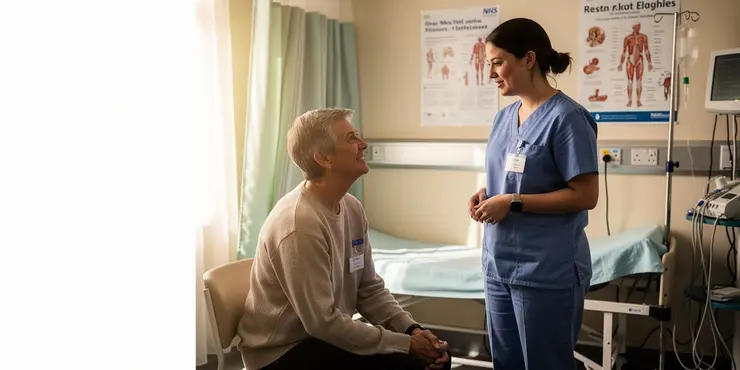
What are the primary symptoms of motor neurone disease?
Relevance: 81%
-

How is breathing affected by motor neurone disease?
Relevance: 77%
-
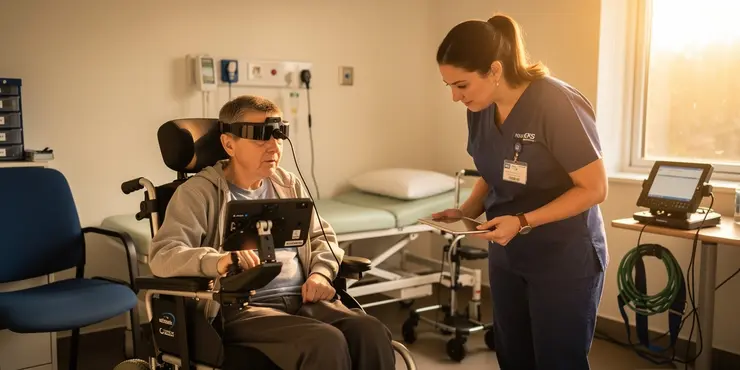
What assistive devices can help people with motor neurone disease?
Relevance: 76%
-
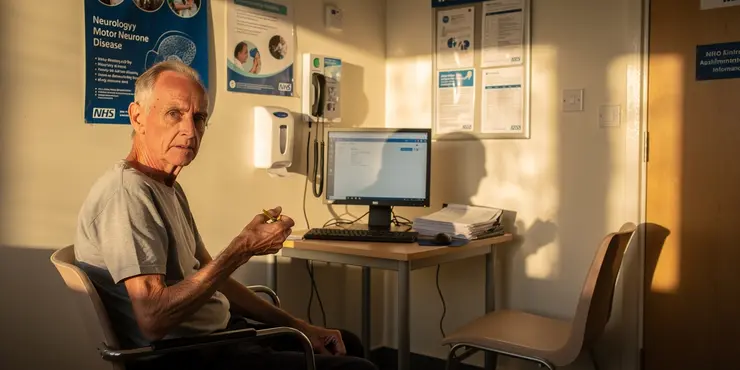
How does motor neurone disease affect the body?
Relevance: 75%
-

Motor neurone disease Julie's story | NHS
Relevance: 74%
-
How does motor neurone disease affect speech?
Relevance: 71%
-
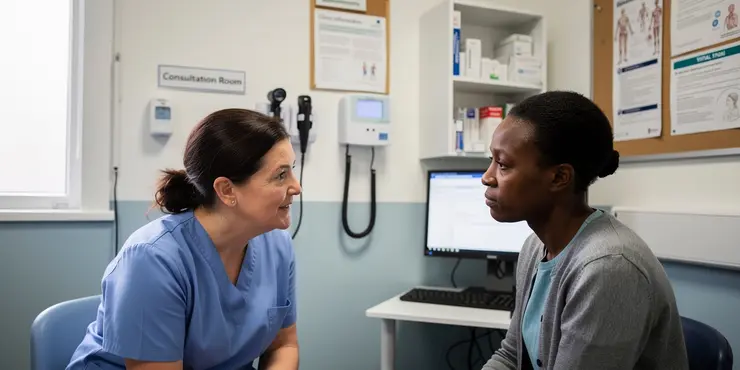
What is the life expectancy after a motor neurone disease diagnosis?
Relevance: 70%
-

How does motor neurone disease impact swallowing?
Relevance: 70%
-
Can lifestyle changes impact motor neurone disease progression?
Relevance: 68%
-

Voice banking service helps people live with motor neurone disease
Relevance: 67%
-

How can caregivers support someone with motor neurone disease?
Relevance: 63%
-
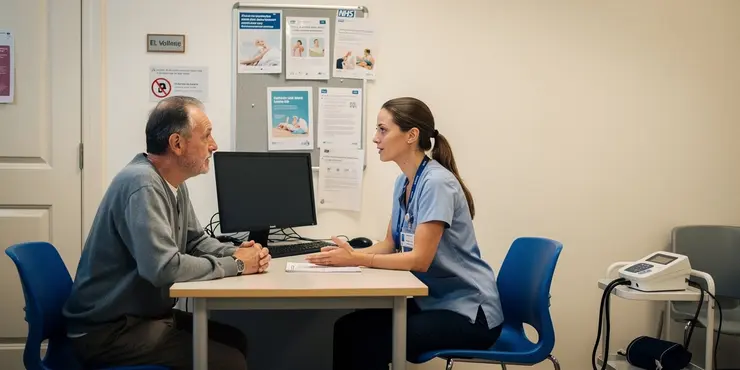
Who is at risk for motor neurone disease?
Relevance: 62%
-
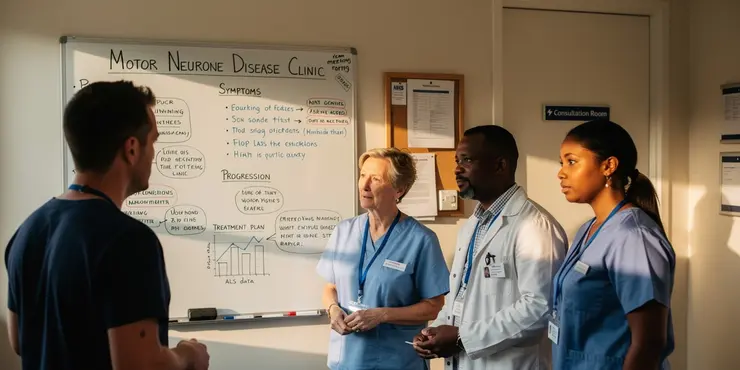
What research is being done on motor neurone disease?
Relevance: 61%
-

Are there support groups for individuals with motor neurone disease?
Relevance: 58%
-

What is the role of genetic testing in Huntington's disease?
Relevance: 43%
-
How does Huntington's disease affect movement?
Relevance: 43%
-

What is MND?
Relevance: 42%
-

What role does genetics play in Alzheimer's disease?
Relevance: 41%
-
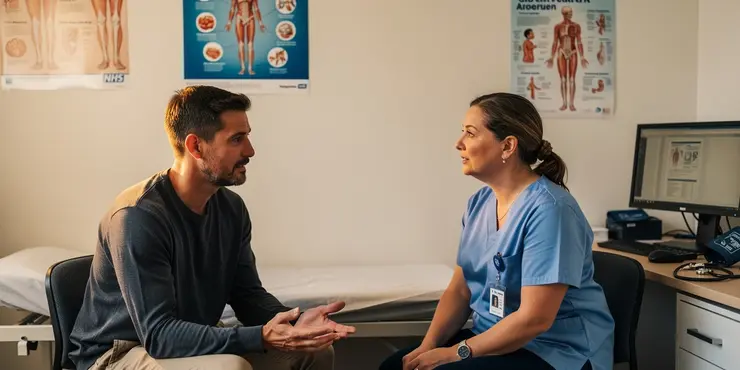
What causes Huntington's disease?
Relevance: 40%
-
What is Parkinson's disease?
Relevance: 37%
-
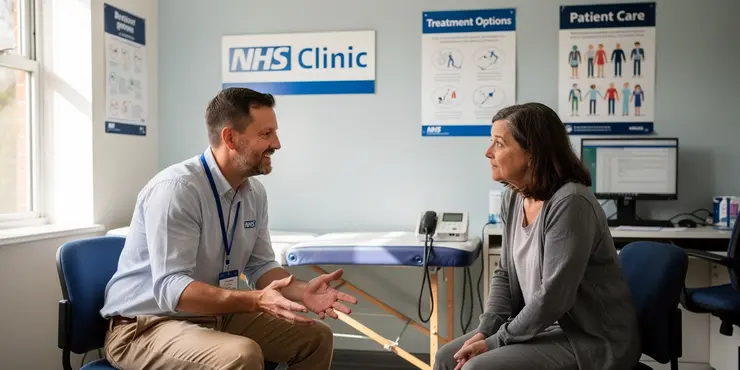
What research is being done on Huntington's disease?
Relevance: 36%
-
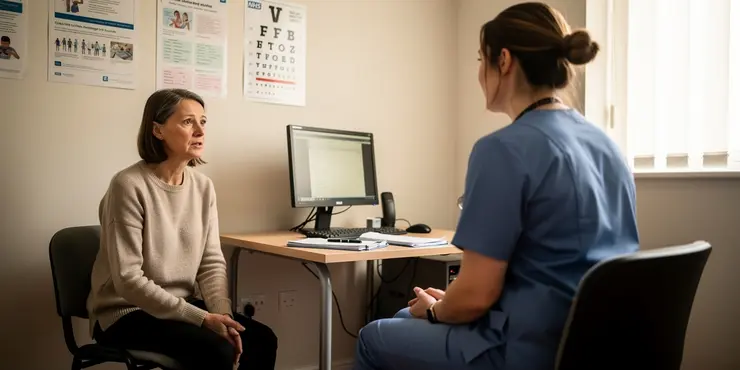
What are the symptoms of Huntington's disease?
Relevance: 34%
-

Can Huntington's disease be prevented?
Relevance: 34%
-

Is there a genetic component to autism?
Relevance: 34%
-

How is Huntington's disease diagnosed?
Relevance: 33%
-
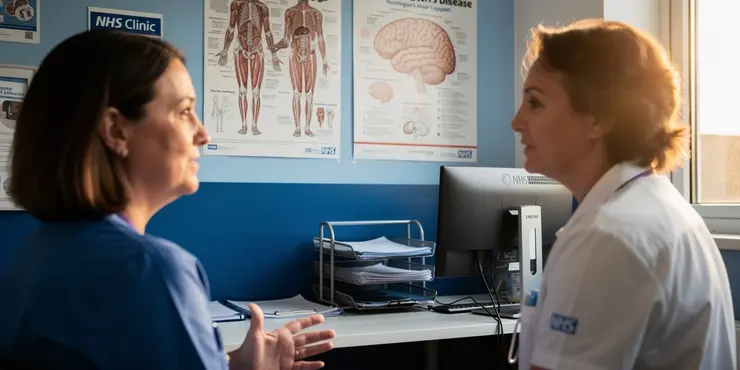
What is Huntington's disease?
Relevance: 33%
-

Is Huntington's disease fatal?
Relevance: 33%
-

What causes Alzheimer's disease?
Relevance: 32%
-
Is there a genetic predisposition to type 1 diabetes?
Relevance: 31%
-

Is genetic testing available for colorectal cancer?
Relevance: 30%
-

Can genetics influence obesity?
Relevance: 29%
-
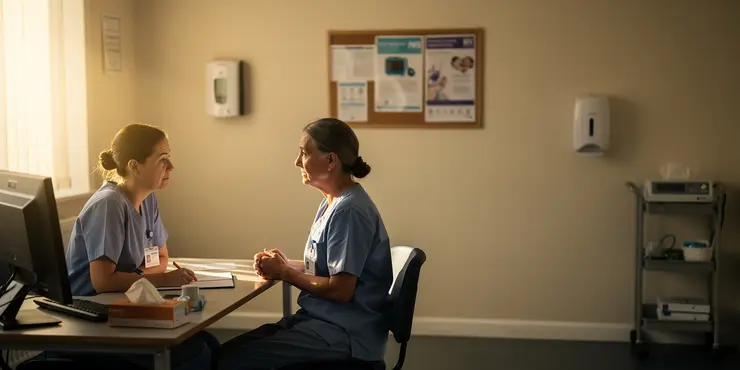
Can Huntington's disease be cured?
Relevance: 29%
The Role of Genetics in Motor Neurone Disease
Motor neurone disease (MND), also known as amyotrophic lateral sclerosis (ALS) in many regions, is a progressive neurological condition that affects the motor neurons, the nerve cells responsible for controlling voluntary muscle movement. The role of genetics in the development and progression of MND has been a significant focus of research, and it is vital to understand how genetic factors contribute to this complex disease.
Understanding Genetic Influence
Genetics plays a crucial role in MND, particularly in familial cases, where the disease is inherited and runs in families. Approximately 5-10% of all MND cases are familial, suggesting a strong genetic component. In these cases, specific gene mutations have been identified as significant contributors to the disease development. Even in sporadic cases, where there is no obvious family history, genetics can still play a role in predisposing individuals to the disease.
Key Genes Associated with MND
Several genes have been linked to MND, with some of the most notable being C9orf72, SOD1, TARDBP, and FUS. The C9orf72 gene is the most common genetic cause of MND and is responsible for a large percentage of familial cases. Mutations in the C9orf72 gene involve an abnormal repetition of a DNA sequence. SOD1 was one of the first genes linked to MND, and mutations in this gene are believed to contribute to about 20% of familial cases. TARDBP and FUS are other important genes where mutations have been implicated in the disease pathway.
Genetic Research and Advances
Research into the genetics of MND has advanced significantly in recent years, with ongoing studies aiming to unravel the complexities of how specific gene mutations lead to neuron degeneration. Cutting-edge technologies, including whole genome sequencing and CRISPR gene editing, are facilitating these discoveries. These advancements hold promise for identifying potential therapeutic targets and developing targeted treatments for individuals with MND.
Implications for Treatment and Testing
Understanding the genetic basis of MND has important implications not only for developing treatments but also for genetic testing and counselling. For individuals with a family history of MND, genetic testing can identify specific mutations and provide information about the risk of developing the disease. Such understanding can guide family planning decisions and allow for earlier monitoring and intervention strategies, potentially improving outcomes or quality of life for those at risk.
The ongoing research into the genetics of MND continues to offer hope for better management and treatment of the condition. Although there is currently no cure, insights from genetic studies are paving the way for novel therapeutic approaches and enhancing our understanding of this challenging disease. For individuals and families affected by MND in the UK and beyond, these advancements represent a critical step towards more effective treatment strategies in the future.
The Role of Genetics in Motor Neurone Disease
Motor Neurone Disease (MND) is sometimes called ALS. It is a disease that affects how muscles work. This happens because of problems with nerve cells, which are tiny parts inside our bodies. Scientists study how our genes, which are like instructions inside us, can make MND happen. Knowing this can help us understand the disease better.
Understanding Genetic Influence
Genes are very important in MND. Sometimes MND runs in families, which means it is passed from parents to children. This happens in about 5-10% of MND cases. Scientists found changes called mutations in certain genes that can cause MND. Even if there is no family history, genes can still make someone more likely to get the disease.
Key Genes Associated with MND
There are some important genes linked to MND. These genes are called C9orf72, SOD1, TARDBP, and FUS. The C9orf72 gene is one of the main causes of MND in families. It has a special change that makes it repeat more than usual. SOD1 was the first gene found to be linked to MND. TARDBP and FUS are other genes where changes can cause MND.
Genetic Research and Advances
Scientists are learning more about genes and MND. They use new tools like whole genome sequencing. This helps them find out how gene changes cause nerve cells to stop working right. These studies can help in finding new treatments for people with MND.
Implications for Treatment and Testing
Understanding genes and MND is important for finding new treatments and for genetic testing. People with MND in their family can see if they have gene changes. This information can help them make decisions about their health and family. Early testing can lead to better care and possibly help those at risk.
Ongoing studies about MND genes give hope for better treatments and understanding. Right now, there is no cure for MND. But learning about genes helps scientists think of new ways to treat it. This is important for people with MND and their families. It may lead to better treatments in the future.
Frequently Asked Questions
What is motor neurone disease?
Motor neurone disease (MND) is a condition that affects the brain and nerves, causing weakness that progressively worsens.
What are the types of motor neurone disease?
The main types of MND include Amyotrophic Lateral Sclerosis (ALS), Progressive Bulbar Palsy (PBP), Progressive Muscular Atrophy (PMA), and Primary Lateral Sclerosis (PLS).
Is there a genetic component to motor neurone disease?
Yes, genetics play a significant role in some cases of motor neurone disease, particularly in familial cases.
What percentage of motor neurone disease cases are familial?
Approximately 5-10% of MND cases are familial, meaning they are inherited from a parent.
What are the main genes associated with familial motor neurone disease?
The main genes associated with familial MND include C9orf72, SOD1, TARDBP, and FUS.
How does the C9orf72 gene mutation affect motor neurone disease?
A mutation in the C9orf72 gene is the most common genetic cause of MND and can lead to abnormal protein deposits in nerve cells.
What role does the SOD1 gene play in motor neurone disease?
Mutations in the SOD1 gene are linked to about 20% of familial ALS cases and can cause toxic accumulation of misfolded proteins in neurons.
Are there genetic tests available for motor neurone disease?
Yes, genetic testing can be done to identify mutations associated with familial motor neurone disease.
Are all cases of motor neurone disease genetic?
No, the majority of cases are sporadic and not linked to a specific genetic cause.
Can gene therapy be used to treat motor neurone disease?
Gene therapy is currently being researched as a potential treatment for MND, particularly for cases with known genetic mutations.
What is the risk of inheriting motor neurone disease if a parent has it?
If one parent has a genetic form of MND, there is a 50% chance of passing the mutated gene to offspring.
Can lifestyle factors influence the risk of developing motor neurone disease?
While genetics play a role, lifestyle factors such as smoking and exposure to toxins may also influence risk.
What research is being done on the genetics of motor neurone disease?
Research is ongoing to identify new genes involved in MND and to develop treatments targeting genetic pathways.
How can genetic counseling help families affected by motor neurone disease?
Genetic counseling can provide information about inheritance patterns, testing options, and support for families.
What is sporadic motor neurone disease?
Sporadic MND occurs in individuals with no known family history of the disease and represents the majority of cases.
Can environmental factors trigger genetic forms of motor neurone disease?
It is possible that environmental factors might influence the onset or progression of genetically predisposed MND.
How do mutations in the TARDBP and FUS genes relate to motor neurone disease?
Mutations in TARDBP and FUS are linked with a subset of familial MND and affect RNA processing and protein handling in neurons.
Has the genetic basis of motor neurone disease been fully understood?
While significant progress has been made, there is still much to learn about the full genetic basis of MND.
What is the C9orf72 repeat expansion and how is it detected?
The C9orf72 repeat expansion is a genetic mutation associated with MND, detected through specific genetic tests.
Are there other diseases related to the same genetic mutations as motor neurone disease?
Yes, some genetic mutations like C9orf72 are also associated with other neurodegenerative diseases such as frontotemporal dementia.
What is motor neurone disease?
Motor neurone disease (MND) is an illness that affects the nerves in the body. These nerves help our muscles work. When someone has MND, their muscles get weaker and it can be hard to move.
Here are some things that might help:
- Ask a doctor for more information.
- Use pictures or videos to learn more.
- Ask someone you trust to explain it to you.
Motor neurone disease, or MND, is an illness. It affects your brain and nerves. It makes you weak, and it gets worse over time.
What types of motor neurone disease are there?
Motor neurone disease (MND) is when the nerves in your body stop working properly. These nerves help your muscles move.
There are different types of MND:
- Amyotrophic lateral sclerosis (ALS): This is the most common type. It makes muscles weak and hard to control.
- Progressive bulbar palsy (PBP): This affects the muscles you use to speak, chew, and swallow.
- Progressive muscular atrophy (PMA): This causes muscles to get smaller and weaker.
- Primary lateral sclerosis (PLS): This makes your muscles stiff and hard to move.
If you want to learn more or need help, ask a doctor or join a support group. They can explain things clearly and help you understand.
Motor Neurone Disease (MND) has different types. Here are the main ones:
Amyotrophic Lateral Sclerosis (ALS) - This is the most common type.
Progressive Bulbar Palsy (PBP) - This type mostly affects the muscles in your mouth and throat.
Progressive Muscular Atrophy (PMA) - This type affects the muscles in your arms and legs.
Primary Lateral Sclerosis (PLS) - This type is less common and affects your walking and balance.
If you need help understanding this, you can:
- Ask someone for help - Talk to a friend or family member.
- Use tools - Try apps that read text out loud.
Can motor neurone disease be passed down from family?
Motor neurone disease (MND) affects the nerves and muscles. Some people may get it because it runs in their family. This means a part of MND might come from genes. Genes are like instructions in our bodies we get from our parents.
If someone in your family has MND, it might be good to talk to a doctor. A doctor or a genetic counselor can help you understand more. They can also do tests to see if you might get MND too.
It is important to talk openly and ask questions. You can use pictures or easy words to help understand better. You can also ask someone you trust, like a family member or a friend, to help you.
Yes, genes can be a big reason why some people get motor neurone disease, especially when it runs in the family.
How many people get motor neurone disease from family?
A small number of people with MND get it from their parents. This is about 5 to 10 out of every 100 people.
What genes are linked to family motor neurone disease?
The genes linked to family-related MND (Motor Neuron Disease) are C9orf72, SOD1, TARDBP, and FUS.
How does a change in the C9orf72 gene affect motor neurone disease?
The C9orf72 gene helps your body work properly. When this gene changes, it can cause problems. This change is called a mutation.
Motor neurone disease (MND) affects how your nerves work. These nerves control your muscles. If nerves don't work right, muscles get weak and hard to use.
The C9orf72 gene change can make MND worse. It makes it harder for nerves to do their job. This makes muscles weaker.
To help understand more, you can:
- Use simple explanations or pictures to learn.
- Watch videos for visual learning.
- Ask a helper, like a teacher or grown-up, to explain.
A change in the C9orf72 gene is the most common cause of MND. This change can make bad protein build up in nerve cells.
For easier reading, try using tools like audiobooks or text-to-speech apps.
What does the SOD1 gene do in motor neuron disease?
The SOD1 gene can cause motor neuron disease. This disease makes it hard for nerves to work. It can make muscles weak.
Tools like speech-to-text or text-to-speech can help understand this.
Changes in the SOD1 gene can cause about 20% of family cases of ALS. These changes can make harmful proteins build up in nerve cells.
Can doctors use genetic tests to find out if someone might get motor neurone disease?
Yes, doctors can use tests to look at your genes. This helps them find changes that can cause family motor neurone disease.
Do all people get motor neurone disease because of their genes?
No, most of the time, this happens by chance and is not because of a specific gene.
Can gene therapy help with motor neurone disease?
Gene therapy is a way to fix genes to help people get better.
Motor neurone disease, or MND, makes muscles stop working.
Scientists are studying if gene therapy can help people with MND.
They hope to find a way to stop the disease or make it less bad.
If you or someone you know has MND, a doctor can give advice.
Scientists are studying gene therapy to see if it can help treat MND (Motor Neuron Disease). This is especially for people who have changes in their genes that cause the disease.
Will I get motor neurone disease if my parent has it?
If your parent has motor neurone disease, you might worry about getting it too:
- Most people don't get it from their parents.
- But sometimes it can be passed down in families.
- Doctors can help you understand more.
It can help to:
- Talk with a doctor to learn about it.
- Ask questions if something is unclear.
If a parent has a gene that can cause MND, there is a 50% chance they will pass it to their child.
Can the way we live change the risk of getting motor neurone disease?
Motor neurone disease is when the nerves in the brain and spine get weak. This makes it hard to move, talk, and breathe.
The way we live is called our "lifestyle". This includes what we eat, how much we exercise, and if we smoke or drink alcohol.
Scientists think that our lifestyle might change the chance of getting motor neurone disease.
Tips to help:
- Eat healthy food like fruits and vegetables.
- Exercise regularly, like walking or playing sports.
- Try not to smoke or drink too much alcohol.
- Ask a grown-up for help when you have questions.
Genes can make a difference, but how you live your life is important too. Things like smoking and being around harmful chemicals can change your risk.
What are scientists studying about motor neurone disease genes?
Scientists are working to find new genes that are linked to MND (a sickness that affects nerves and muscles). They are also trying to make new medicines to help people with this illness.
Here are some helpful tools if you want extra support:
- Text-to-Speech Software: This can read out loud what is written.
- Simple Glossaries: Look up hard words in easy dictionaries.
- Visual Aids: Use pictures and diagrams to better understand the information.
How can talking to a genetic counselor help families with motor neurone disease?
Motor neurone disease is an illness that can affect families. A genetic counselor is a person who can talk to you about genes and health. They can help you understand the disease.
Here is how they can help:
- Easy Information: They can explain things in a simple way.
- Answer Questions: You can ask them questions about the disease.
- Family History: They can talk about how family history affects the disease.
- Options: They can tell you what choices you have.
You can also use pictures and videos to learn more. Ask someone you trust to help you understand the information.
Genetic counseling helps families understand how traits are passed down through genes. It also explains testing choices and gives support.
What is sporadic motor neurone disease?
Sporadic motor neurone disease is an illness that affects nerves in the body. These nerves are called motor neurones. They help the brain talk to the muscles so we can move. When someone has this disease, their muscles get weaker and it gets harder to move.
It can happen to anyone, and doctors are still learning why it starts. It is not caused by someone in your family having it.
If you or someone you know wants to learn more, you can look at pictures or videos about it, talk to a doctor, or ask someone you trust for help.
Sporadic MND happens in people who do not have any family members with the disease. This is the most common type.
Can things in the environment cause genetic motor neurone disease?
Things around us can sometimes affect when or how a disease like MND starts or gets worse. If someone has genes that make them more likely to get the disease, certain things in the environment might change how it shows up.
How do changes in TARDBP and FUS genes link to motor neuron disease?
Sometimes, tiny parts of our body called genes can change. These changes are called mutations. Two genes, named TARDBP and FUS, can change in ways that may cause a sickness called motor neuron disease.
Motor neuron disease makes it hard for our body to use muscles. This is because the muscles get weaker and harder to control.
If you want to understand this better, you can use pictures or videos. You can also talk to someone who knows a lot about genes to help you learn more.
Changes in TARDBP and FUS genes can cause some types of family-related MND (a nerve disease). These changes affect how cells handle RNA and proteins in nerve cells.
Do we know everything about how genes cause motor neurone disease?
No, scientists are still learning.
Motor neurone disease (MND) is a condition where nerve cells stop working. Scientists know some things about it, but not everything.
Here are some ways to get help understanding this topic:
- Use simple books or videos to learn more about MND.
- Ask a teacher or a helper for explanations.
- Look for pictures that show how MND affects the body.
- Use apps or tools that read text aloud.
We have learned a lot, but we still have more to find out about how genes are linked to MND (Motor Neuron Disease).
What is the C9orf72 repeat expansion and how do we find it?
The C9orf72 repeat expansion is a change in some genes. Genes are like instructions in our body. This change can make people sick.
To find this change, doctors do a test. They look at your genes to check for the C9orf72 change.
If you or someone you know needs more help, you can:
- Ask a doctor or nurse. They can explain things.
- Find a support group. Talking to others can help.
- Use pictures or videos. These can make things clearer.
The C9orf72 repeat expansion is a change in a gene. This change is linked with a disease called MND. Doctors can find this change with special tests.
Do the same genes that cause motor neurone disease cause other illnesses too?
Yes, some changes in genes, like C9orf72, are linked to other brain diseases like frontotemporal dementia.
Useful Links
This website offers general information and is not a substitute for professional advice.
Always seek guidance from qualified professionals.
If you have any medical concerns or need urgent help, contact a healthcare professional or emergency services immediately.
Some of this content was generated with AI assistance. We’ve done our best to keep it accurate, helpful, and human-friendly.
- Ergsy carfully checks the information in the videos we provide here.
- Videos shown by Youtube after a video has completed, have NOT been reviewed by ERGSY.
- To view, click the arrow in centre of video.
- Most of the videos you find here will have subtitles and/or closed captions available.
- You may need to turn these on, and choose your preferred language.
- Go to the video you'd like to watch.
- If closed captions (CC) are available, settings will be visible on the bottom right of the video player.
- To turn on Captions, click settings .
- To turn off Captions, click settings again.
More Items From Ergsy search
-

What role do genetics play in motor neurone disease?
Relevance: 100%
-
Is motor neurone disease hereditary?
Relevance: 97%
-

What causes motor neurone disease?
Relevance: 96%
-

What is motor neurone disease?
Relevance: 96%
-
Are there different types of motor neurone disease?
Relevance: 92%
-

Is there a cure for motor neurone disease?
Relevance: 89%
-

How is motor neurone disease diagnosed?
Relevance: 85%
-

What treatments are available for motor neurone disease?
Relevance: 81%
-

What are the primary symptoms of motor neurone disease?
Relevance: 81%
-

How is breathing affected by motor neurone disease?
Relevance: 77%
-

What assistive devices can help people with motor neurone disease?
Relevance: 76%
-

How does motor neurone disease affect the body?
Relevance: 75%
-

Motor neurone disease Julie's story | NHS
Relevance: 74%
-
How does motor neurone disease affect speech?
Relevance: 71%
-

What is the life expectancy after a motor neurone disease diagnosis?
Relevance: 70%
-

How does motor neurone disease impact swallowing?
Relevance: 70%
-
Can lifestyle changes impact motor neurone disease progression?
Relevance: 68%
-

Voice banking service helps people live with motor neurone disease
Relevance: 67%
-

How can caregivers support someone with motor neurone disease?
Relevance: 63%
-

Who is at risk for motor neurone disease?
Relevance: 62%
-

What research is being done on motor neurone disease?
Relevance: 61%
-

Are there support groups for individuals with motor neurone disease?
Relevance: 58%
-

What is the role of genetic testing in Huntington's disease?
Relevance: 43%
-
How does Huntington's disease affect movement?
Relevance: 43%
-

What is MND?
Relevance: 42%
-

What role does genetics play in Alzheimer's disease?
Relevance: 41%
-

What causes Huntington's disease?
Relevance: 40%
-
What is Parkinson's disease?
Relevance: 37%
-

What research is being done on Huntington's disease?
Relevance: 36%
-

What are the symptoms of Huntington's disease?
Relevance: 34%
-

Can Huntington's disease be prevented?
Relevance: 34%
-

Is there a genetic component to autism?
Relevance: 34%
-

How is Huntington's disease diagnosed?
Relevance: 33%
-

What is Huntington's disease?
Relevance: 33%
-

Is Huntington's disease fatal?
Relevance: 33%
-

What causes Alzheimer's disease?
Relevance: 32%
-
Is there a genetic predisposition to type 1 diabetes?
Relevance: 31%
-

Is genetic testing available for colorectal cancer?
Relevance: 30%
-

Can genetics influence obesity?
Relevance: 29%
-

Can Huntington's disease be cured?
Relevance: 29%


